- Home
- P. T. Deutermann
The Iceman Page 6
The Iceman Read online
Page 6
Firefish’s instructions were broadly stated. Get into that 250-mile-long channel between Rabaul and the Marine beachheads on Guadalcanal and do some damage. Malachi put a finger down on the chart of New Georgia Sound between the islands of Santa Isabel and Choiseul. “Let’s go in here,” he said. “That’s almost twenty miles wide and probably too deep to mine. Then we’ll see what, if anything, shows up.”
They stayed submerged until dark, creeping along at a bare five knots. The younger sailors who’d been getting seasick were much relieved. During that time Malachi told Marty to have the forward torpedo room crew pull each of the six fish in the bow tubes and do what was called “routining” the torpedoes. This involved basic maintenance checks on the weapon’s major systems, checking for fuel leaks, electrical grounds, free operation of the control fins, and the settings for the warhead.
In the eight months since submarine warfare had begun against Japan, though, over half of the magnetic exploder torpedoes fired had simply driven under their targets without doing anything. Since the torpedoes were steam-driven, they left a telltale wake pointing right back to where the submarine was lurking, making it easier for escorts to find them. The skippers were understandably not happy with such poor torpedo performance. The contact exploders worked better than that, although they, too, appeared to be defective far too many times. Some speculated that the torpedo itself wasn’t running at the set depth.
Malachi had elected to disregard the orders about using the magnetic exploder, and had the torpedo crew deactivate the magnetic feature and set the fish for a contact hit. His crew was in full support. The admirals could issue all the orders they wanted, but they were safe on their tenders in Perth and Brisbane, while the sub crews were always going to be at the point of origin of that telltale wake. The exec personally oversaw the deactivation of the magnetic exploders and then the reloading of all six forward tubes. They’d do the four after torpedoes the next time they went down for the day.
The weather was still miserable when they surfaced but now they could make some decent speed on the diesels while charging the battery. In the eight hours they’d been submerged they’d traveled 40 miles. Now, assuming nothing turned up overnight, they’d make more like 160 miles, which would put them just outside of that 20-mile-wide channel into the New Georgia Sound. The exec put the bridge watches on two-hour shifts so they could come down and dry out from the thrashing seas topside. At nine that night he met again with Malachi to review the operations plan for the following day.
Malachi handed over some more messages that had come in, these detailing the progress of the landings on Guadalcanal, which, so far at least, hadn’t encountered too much resistance. A second message informed them that another boat, the Bluefish, would also be operating in the New Georgia Sound, but much closer to Guadalcanal than Firefish would be.
“Make sure Perth knows where we’re going to set up shop,” Malachi said. “Make Bluefish info on that message.”
“Yes, sir, I’ll get right on it.”
“And call me when we’re ready to turn into the Sound. These charts with no soundings recorded give me bad dreams.”
At dawn they went back down even as the weather cleared and the seas began to calm. Malachi picked a course into the Sound that went right down the middle between the two islands, and a running depth of 200 feet. He instructed the quartermaster to take fathometer soundings all the way in so they could begin to construct a useful chart of the area. Halfway into the Sound, the sonar operator picked up the propeller noises of several large ships approaching from the southeast at high speed.
“How close, Sonar?”
“Not close, Captain, but they’re by God hauling ashes. Twenty-five, thirty knots. Sound like cruisers and destroyers, and their bearing is changing too fast to track.”
Malachi considered coming up to periscope depth to take a look, but if they were going that fast, there was no chance Firefish could set up a shot at them, so why risk detection? Especially if the Japs had air cover from their strips at Rabaul and Buin. The fathometer was reporting that the depth beneath the keel was 3,000 feet, so he ordered the boat down to 300 feet. He noted with satisfaction that the previous drama about going to test depth seemed to have vanished. “I wonder what that gang has been up to,” he said.
They came back up at nautical twilight and the navigator took star sights with the periscope to get a real fix on their position. They were out in the middle of the Sound, islands all around them, good, deep water, and clearing weather. The fleet broadcast brought them news of what that Jap cruiser formation had been doing down near Guadalcanal: sinking four Allied heavy cruisers, damaging a fifth plus two destroyers in one of the most lopsided defeats for the American Navy in history. The broadcast reported almost eleven hundred American sailors killed in action.
“Vigorous reaction indeed,” Malachi said as he passed the message around the wardroom table. “I wish we’d been a day earlier.”
“They’ll probably be going back,” Marty pointed out.
“Then let’s see if we can plot out exactly what track line they were running today. How far out in the Sound—right up the middle? And then let’s park on that track and see who shows up. There’s no way we can get a shot off if they’re driving by at thirty knots—but if we’re on the track, we can shoot at their bows and maybe do some good work for Jesus.”
“We do that, the entire battle line will run right over us,” Peter Caldwell said.
That produced a moment of silence until Malachi nodded. “Yes, they will, which will allow me to fire stern tubes at them once they pass overhead.”
That silenced the table for real.
SEVEN
At 2100 they were out in the middle of New Georgia Sound, equidistant between Bougainville and a group of islands called the Shortlands. The night was dark and clear with only a sliver of moon, and the seas had subsided to the usual deep ocean swell. Malachi perched on the navigation bridge bullrail, sipping some fresh coffee and cupping a cigarette so that it wouldn’t show in the darkness. Two lookouts were high on the periscope tower, and two more on the navigation bridge, along with the officer of the deck, LTJG Billy Sullivan, the torpedo and fire-control officer. The battery was fully charged, so the diesels rumbled along quietly at six knots as the sub ran an east-west racetrack pattern to stay close to their best estimate of where an enemy task force might run. If indeed there was one headed down to Guadalcanal tonight.
Malachi heard the electric motor for the air search radar whine into life, make two sweeps, and then stop again. A moment later the surface search radar did the same thing, only this time he saw the red light on the bitchbox come on.
“Conn, Radar: we have surface contacts bearing three four six, range twelve miles, course and speed unknown until we get another mark. Looks like a column, though.”
He reached for the talk switch. “Conn: aye, take one more look in three minutes, and then we’ll dive. Pass the word: battle stations torpedo in five minutes.”
He looked up at the lookouts and motioned them to get below. “Mister Sullivan, pass the word to Control to prepare to dive. In the meantime, come left to three four six.”
Although he couldn’t hear it, he knew the crew would already be hustling to their general quarters stations, if only to avoid the usual mad scramble through all those knee-knocking hatches. He stepped on his cigarette, pitched it overboard, and told the OOD to get below, leaving him alone on the bridge. It was an exciting feeling, knowing a Jap formation was headed his way. He’d seen pictures of those Jap cruisers. They were beautiful the way a king cobra is beautiful: black, sleek, and bristling with guns and torpedoes. They routinely ran around at over 30 knots, and were rumored to have some of the best optics in the world for their fire-control systems. If they were running 30 now, they’d be on top of Firefish in exactly eight minutes. By doctrine, he should be going deep right now, but the radar gang needed that second look to be able to compute their course and speed, vit
al inputs to the TDC. He heard the surface search radar antenna crank around twice.
“Conn, Radar: enemy course and speed is one seven zero, thirty-two knots.”
From the tone of the radarman’s voice it was clear he’d done the math, too, and was now anxious for Malachi to give the order.
“Conn: aye,” Malachi said, and pulled the dive alarm. He dropped through the conning tower hatch even as he heard the two radar masts coming down into their fairings. He tripped the holdback latch, dropped the round steel hatch, and dogged it firmly in place. “Hatch is closed,” he called down into the conning tower as the boat slanted down. “Make your depth sixty feet.”
The exec was already in the conning tower by the time Malachi landed on the deck. “Sixty feet, we might collide if those are heavy cruisers, sir,” he said, obviously alarmed. “They draw thirty, thirty-two feet.”
“I know that, XO, and I won’t stay here any longer than I need to. But I want to be pointing right at them when I fire, so I need to see. Radar: any idea of how many ships are coming?”
“Five, maybe seven, Captain,” the radarman said. “The contacts were all bunched up since we’re looking at them bow-on.”
“Very well. Up scope. Based on a DR, how far away are they? And does sound have contact?”
“Based on their computed course and speed, they’ll be on top in five minutes, Captain.”
The sonarman raised his hand. “Screwbeats, bearing three four two, sharp up-Doppler.”
“Open all outer door, fore and aft. Make ready tubes one through four forward, and seven and eight aft. Speed high. Running depth ten feet. Contact exploder mode. XO, if you can get a TDC solution using sound bearings and estimated speed, good, but I plan to fire a two-degree spread of four right down the throat at twenty-five hundred yards and then dive to two hundred feet. Once the main body passes overhead, I plan to fire seven and eight on the reciprocal bearing, and then get down to two hundred fifty feet and drive ninety degrees off attack axis.”
“Aye, aye, sir,” Marty said and then huddled with the fire-control team next to the plotting table.
Having issued his attack orders, Malachi reviewed the picture in his mind. Two thousand yards was a bit of a long shot, except for the fact that the boat’s torpedoes and the column of targets would be closing each other at nearly 78 knots. They should intersect at about 750 yards, not quite half a mile. Putting in a spread command meant that the torpedoes would begin to diverge when fired, so that instead of running parallel to each other, they would spread out into a narrow fan to increase the chances of hitting something. He took a look through the periscope, but could see absolutely nothing.
“Mark your depth,” he snapped. Then he realized he hadn’t heard the stable-at-ordered-depth report.
“Mark my depth seventy-five feet and coming up to sixty.”
Malachi swore. He’d wanted a look before firing, but they were too deep. And they were out of time.
“Captain, the lead ship is only three thousand yards away,” Marty called. “We gotta shoot and get down, right now.”
“You have a solution?”
“No, sir, not enough time.”
The forward torpedo room reported tubes one through four ready. Everyone in the conning tower was staring at him, as if willing him to give the order. And then he realized he could hear those screwbeats as a formation of twelve-thousand-ton cruisers bore down on Firefish.
“Very well. Fire one.” He fired the next three slightly faster than the ten-second intervals normally used. “Flood negative, make your depth two hundred feet. Seven knots. Ten-degree down-bubble. Make ready eight and nine.”
The noise of the approaching formation grew louder and louder as Firefish assumed an even steeper down angle, the thrashing of destroyer propellers intermingling with the heavier thumping of the cruisers. Malachi was confident he’d be deep enough by the time those cruisers went overhead. He also knew that his attack had been a definite case of winging it, but it was the best he could do against ships going that fast.
A large explosion shook the boat as it passed through 140 feet, followed by a second one. Then the maelstrom of big propellers rushing overhead drowned out all other sounds. He issued the new attack instructions for the reciprocal course and then waited for down-Doppler before coming back up.
“Fire eight,” Malachi ordered. Ten seconds. “Fire nine. Blow negative!”
He’d done all the shooting he could do, while still keeping two fish ready at each end. Now he had to get the boat back under control, as he watched the depth gauge rotating at an alarming rate. The noise of the cruiser formation began to diminish as Firefish ran back along their track. He sent the XO down to Control to supervise the planesmen, who were obviously having trouble getting her back on an even keel as they sought out the safety of 200 feet. In the distance they heard what sounded like a metallic thud and the sonarman swore. “Dud, bearing one seven zero.”
The boat leveled up, courtesy of the exec’s quiet stream of orders to the diving officer, who’d apparently lost the bubble again in the excitement of having the Jap formation passing overhead. Five minutes later he got the stable-at-ordered-depth report.
“Make your depth two hundred fifty feet and come to course two seven zero,” he ordered, and then lit up a cigarette. “Sound: any echo ranging?”
“Negative, sir. It mostly sounded like they just kept going.”
“But we hit something,” Malachi said. He walked over to the plotting table. “Not much data was there,” he said. The plotters looked at him and shrugged. They’d had no time to set up a nice, clear plot, enter anticipated course, speed, and bearing information into the TDC and then wait for the computer to confirm that their info seemed reasonable and issue orders to the torpedoes themselves. On the other hand, he’d fired four fish directly into the teeth of that approaching column and registered two explosions.
“Okay,” he said. “Lay out a course at three knots to get three miles away from where all that noise was, and then we’ll come up, take a look, maybe creep back and see if there’s a cripple.”
The exec came back up into the conning tower. “When we do come up for a look, we need to get a contact report out to the Navy units down near Guadalcanal. Let ’em know they got company coming.”
“Do we have a direct comms link with Guadalcanal?”
Marty frowned as he thought for a moment. “No, sir, I guess we don’t. We can radio Perth, they can radio…” He stopped, having no idea of what the communications path with the invasion forces was.
“Yeah, that’s something we have to figure out,” Malachi said. “Add that as a question when we make our after-action report. In the meantime, reload, XO. Reload.”
An hour later they came up to periscope depth. The moon was flitting in and out of view as a high cloud deck began to move in over the Sound, but there was a faint orange glow of a fire to the south of their position. “Something’s burning,” Malachi said. He swung the scope through 360 degrees to make sure there wasn’t a Jap destroyer right behind them. “Get me two radar sweeps, air and surface.”
The radar revealed three contacts to the south, about six miles away. Two small, one large. Air search had no contacts.
“Prepare to surface,” Malachi ordered.
“We should at least try to alert the amphib forces at Guadalcanal of what’s coming,” Marty said.
Malachi shook his head. “We don’t have a direct HF channel, and going through Perth to Brisbane, Brisbane to Pearl, Pearl back to whoever’s in charge down there will take hours. Plus, I don’t want to light up the Japanese HF radio direction finding net. The Japs have too many forces at Rabaul that could come out and hunt our asses down. No, I still want to see if we’ve got a cripple down there and sink him. Now, surface.”
They were up four minutes later. The diesels lit off and took the opportunity to feed their hungry batteries. Malachi ordered another radar sweep, which showed the three surface contacts to the south wer
e still there. The glow he’d seen earlier was gone.
“Take another single sweep in three minutes,” he ordered. “See if they’re moving at all. They may be setting up a tow. I’m going topside. Two lookouts this time.”
Three minutes later, the conning tower plotters reported that the three contacts appeared to be moving northwest at three knots. They asked for a few more single-sweeps to confirm that.
“Yes, go ahead and do that, but single sweeps only.” He called for the XO. Marty joined him on the navigation bridge.
“XO, I want to drive to a point three miles ahead of them on their current track. Once there, we’ll submerge and begin our approach. How’s the reload going?”
“Tube one is reloaded. Tube two in progress. Five and six are ready. Aft takes a lot longer—there’s just no room.”
“Okay, I have two already loaded aft. I plan to shoot four at the cripple, and keep two back for emergencies. I’m guessing one destroyer is towing, the other patrolling ahead, looking for us. I want to get into fifteen hundred yards and let ’em all go straight in at the big one. Then I’m going to go deep and go under them.”
“Sir?”
“Yes, under them. The torpedoes will get there before we do. They’ll know the fish came from ahead, but two of them can’t do anything about that when they’re married by a towing hawser. The first tin can will charge ahead to gain contact on us, but by then I mean to be deep and going deeper.”
“That’s really risky, Captain,” Marty said. “If the can that’s out front gets a contact, even a fleeting one, he’ll tell the can doing the towing to roll a load.”
“If he’s still there, XO,” Malachi said. “I want you to be the diving officer, because I’m going to call for a twenty-degree down-bubble and full power until all the noise is astern. Then we’re going to come all the way back up and take a look.”

 The Nugget
The Nugget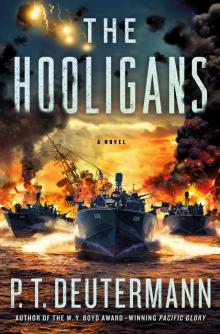 The Hooligans
The Hooligans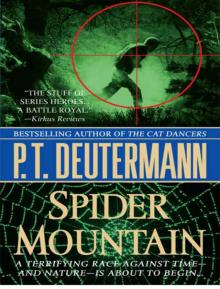 SPIDER MOUNTAIN
SPIDER MOUNTAIN![Cold Frame [retail] Read online](http://i1.bookreadfree.com/i/03/19/cold_frame_retail_preview.jpg) Cold Frame [retail]
Cold Frame [retail] Sweepers
Sweepers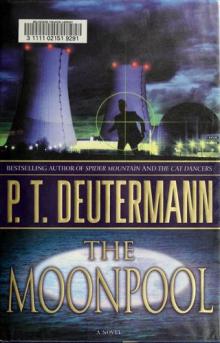 Cam - 03 - The Moonpool
Cam - 03 - The Moonpool Trial by Fire
Trial by Fire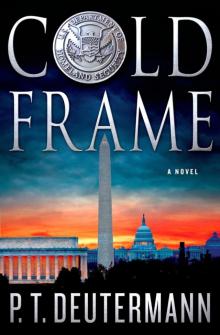 Cold Frame
Cold Frame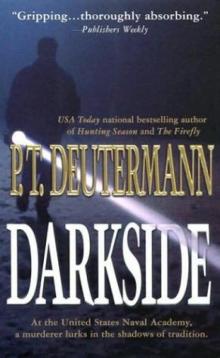 Darkside
Darkside Cam - 04 - Nightwalkers
Cam - 04 - Nightwalkers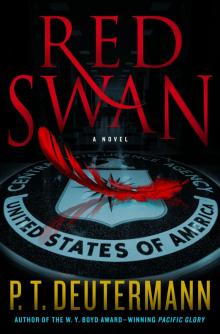 Red Swan
Red Swan The Commodore
The Commodore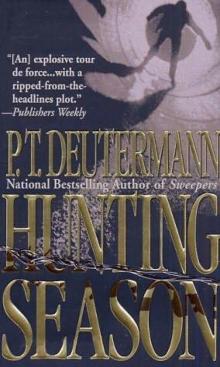 Hunting Season
Hunting Season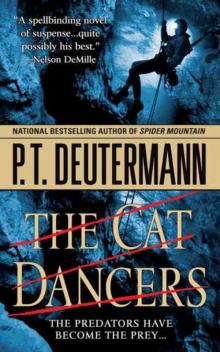 The Cat Dancers
The Cat Dancers Scorpion in the Sea
Scorpion in the Sea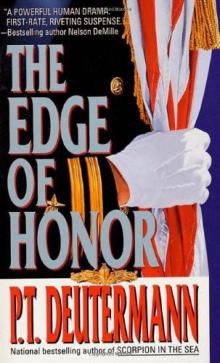 The Edge of Honor
The Edge of Honor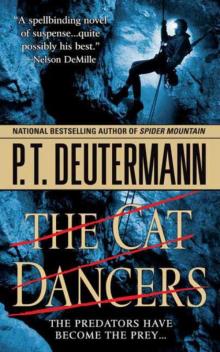 The Cat Dancers cr-1
The Cat Dancers cr-1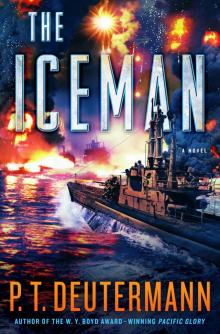 The Iceman
The Iceman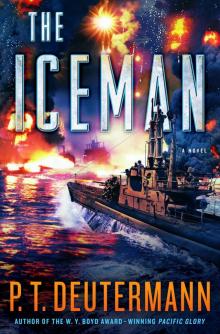 The Iceman_A Novel
The Iceman_A Novel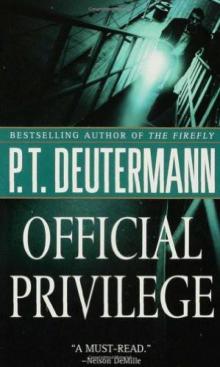 Official Privilege
Official Privilege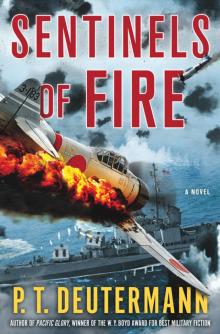 Sentinels of Fire
Sentinels of Fire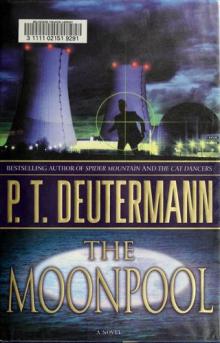 The Moonpool cr-3
The Moonpool cr-3 Nightwalkers cr-4
Nightwalkers cr-4 The Firefly
The Firefly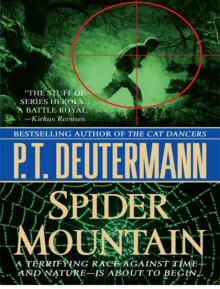 Spider mountain cr-2
Spider mountain cr-2 Pacific Glory
Pacific Glory The Last Man
The Last Man